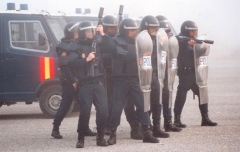Madrid, 19 February 2013 – Concerned at the lack of transparency around the growing use of force by police in protest situations, Access Info Europe has presented access to information requests in 41 countries, asking for details ranging from the use of equipment such as rubber bullets, batons and water cannons, to training of police officers and evaluation reports on the policing of protests.
In the context of the economic crisis, Europe is seeing a rising number of street protests, some of which have been accompanied by violence.
It is essential that civil society and the media have sufficient information about how police are preparing for, handling, and evaluating protests in order to ensure that the rights to freedom of assembly and expression are respected.
“We are hearing more and more reports from across Europe about aggressive policing of public protests yet our research has shown that there is insufficient clarity about how police are preparing for protests and the rules and guidance governing use of force,” commented Lydia Medland, Research and Campaigns Coordinator.
The European Convention on Human Rights protects the act of protest through the rights to freedom of expression (Article 10) and to freedom of assembly (Article 11). “With these requests we aim to get a better comparative picture and contribute to debate on appropriate policing techniques consistent with European human rights law,” added Medland.
As part of its Access for Rights work which includes investigations into secret CIA flights (Rendition on Record) and migration-related detention, Access Info Europe has identified policing of protests as a priority area, following earlier research which includes The Right to Know: Europe and the Police and The Right to Protest Briefing developed with Statewatch.
The requests sent by Access Info Europe seek access to data on the amount of special protest equipment (rubber bullets, water cannons, etc.) held by police forces and the frequency with which such equipment has been used. Access Info has also asked for details of legislation governing protests and access to copies of the guidance issued to police forces on the use of special equipment. A sample copy of a request can be found below.
The requests have been submitted to 41 countries across the Council of Europe region see list here to police forces where an access to information contact point has been identified, and where not to the relevant Ministry. The great majority of the countries selected have access to information laws; Ireland is the only country where the police are explicitly exempt from the country’s national freedom of information law.
Access for Rights Briefing: The Right to Protest
Copy of Request Sent to 41 Countries (Albania Version)
Follow the request made in Spain via Tuderechoasaber.es
Follow the request made in UK via whatdotheyknow
Follow the request made in Germany via Frag den Staat
For more information contact:
The requests have been sent to the following countries (41): Albania, Armenia, Austria, Belgium, Bosnia and Herzegovina, Bulgaria, Croatia, Cyprus, Czech Republic, Denmark, Estonia, Finland, France, Germany, Greece, Hungary, Iceland, Ireland, Italy, Kosovo, Latvia, Liechtenstein, Lithuania, Luxembourg, Macedonia, Malta, Montenegro, Netherlands, Norway, Poland, Portugal, Romania, Serbia, Slovakia, Slovenia, Spain, Sweden, Switzerland, Turkey, United-Kingdom, Scotland.

